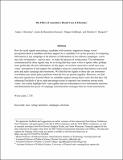The Effect of Associative Racial Cues in Elections
Author(s)
Berinsky, Adam; de Benedictis-Kessner, Justin; Goldberg, Megan E.; Margolis, Michele F.
DownloadSubmitted version (862.6Kb)
Open Access Policy
Open Access Policy
Creative Commons Attribution-Noncommercial-Share Alike
Terms of use
Metadata
Show full item recordAbstract
How do racial signals associating a candidate with minority supporters change voters’ perceptions about a candidate and their support for a candidate? Given the presence of competing information in any campaign or the absence of information in low-salience campaigns, voters may rely on heuristics–such as race–to make the process of voting easier. The information communicated by these signals may be so strong that they cause voters to ignore other, perhaps more politically relevant, information. In this paper, we test how associative racial cues sway voters’ perceptions of and support for candidates using two experiments that harness real-world print and audio campaign advertisements. We find that the signals in these ads can sometimes overwhelm cues about policy positions when the two are present together. Moreover, we find that such signals have limited effects on candidate support among Black voters but that they risk substantial backlash of up to eight percentage points in reported vote intention among White voters. Our results highlight how voters gather and use information in low-information elections and demonstrate the power of campaign communication strategies that use racial associations.
Date issued
2020-03Department
Massachusetts Institute of Technology. Department of Political ScienceJournal
Political Communication
Publisher
Informa UK Limited
Citation
Berinsky, Adam J. et al. "The Effect of Associative Racial Cues in Elections." Political Communication 37, 4 (March 2020): 512-529. © 2020 Taylor & Francis
Version: Original manuscript
ISSN
1058-4609
1091-7675